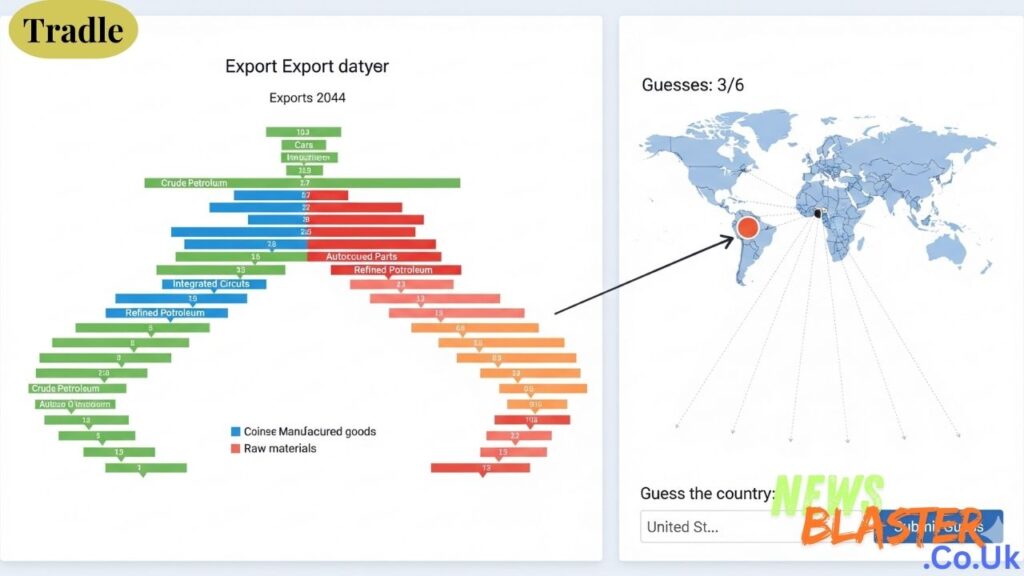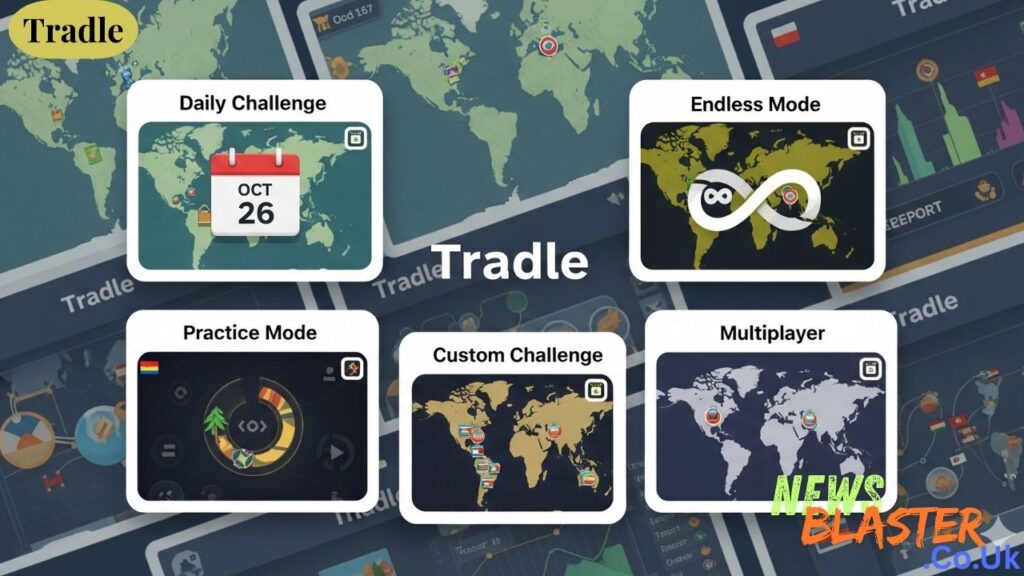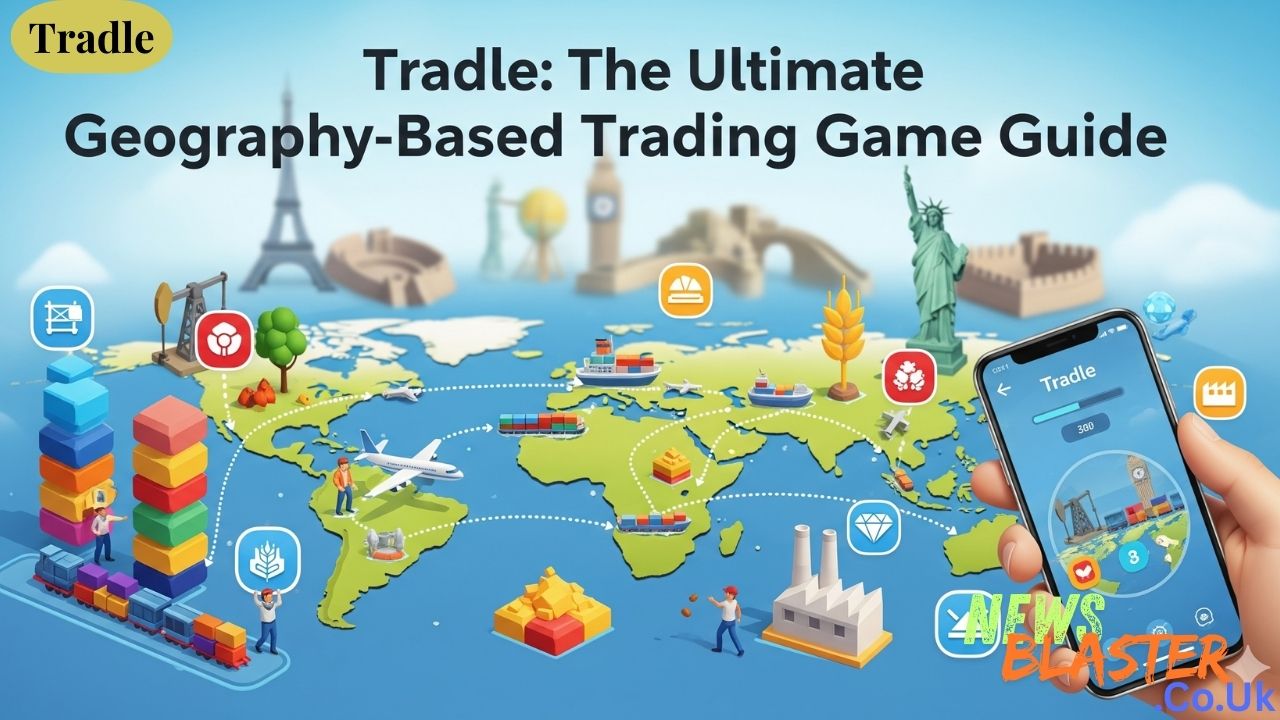Introduction to Tradle
In the world of educational gaming, few experiences combine learning and entertainment as seamlessly as tradle. This innovative geography-based guessing game challenges players to identify countries based on their export distribution patterns, creating an engaging way to explore global trade relationships.
The tradle game was developed by The Observatory of Economic Complexity (OEC), a renowned organization dedicated to making economic data accessible and understandable. The oec tradle represents a perfect marriage between educational content and interactive gameplay, proving that learning about international economics doesn’t have to be boring.
Unlike traditional geography games, tradle oec follows a unique format where players have six attempts to correctly identify a mystery country. This structure mirrors popular puzzle games while maintaining its educational focus on global trade patterns. The game’s primary purpose extends beyond mere entertainment – it’s designed to provide engaging and enjoyable learning experiences about worldwide economic relationships.
How Tradle Works

The core mechanic of this fascinating game revolves around interpreting export data visualizations. Players examine detailed treemaps that display a country’s export distribution across various product categories. These visual representations make complex economic data digestible and fun to analyze.
After each guess, the game provides comprehensive feedback including distance measurements, directional indicators, and proximity percentages. This guidance system helps players refine their subsequent attempts while learning about geographic relationships between nations.
The visual elements play a crucial role in the gameplay experience. Export distribution charts and detailed treemaps showcase different product categories, from agricultural goods to manufactured items. These data visualizations serve as the primary clues that guide players toward the correct answer.
The hint structure combines geographic knowledge with economic reasoning. Players must consider factors like climate, natural resources, development levels, and regional trade patterns to make educated guesses about which country matches the displayed export profile.
Game Variations

The standard version offers a daily challenge format, providing fresh content that keeps players returning regularly. This approach builds a consistent learning habit while maintaining the excitement of discovering new countries and their unique export characteristics.
For those seeking unlimited entertainment, there’s an endless gameplay option that removes daily restrictions. This variation allows players to practice their skills continuously without waiting for the next day’s challenge.
The gaming platform also features related experiences that expand on the core concept. One variation challenges players to identify the top five exporters of specific products, while another asks them to find connections between different traded goods based on common characteristics.
Educational Value

The game significantly enhances geographical knowledge by familiarizing players with countries worldwide and their relative positions. Through repeated gameplay, users develop a stronger mental map of global geography while learning about economic relationships.
Economic education forms another cornerstone of the experience. Players absorb information about international trade patterns naturally, without feeling like they’re studying complex economic theories. This organic learning approach makes sophisticated concepts accessible to players of all backgrounds.
Data literacy skills develop as players learn to interpret various economic visualizations. The game introduces users to reading treemaps, understanding export categories, and analyzing economic data presentations – valuable skills in today’s data-driven world.
Cultural awareness grows as players connect countries with their primary economic activities. Understanding what nations export reveals insights into their natural resources, industrial capabilities, and economic priorities.
Game Strategy and Tips
Successful players develop pattern recognition skills by learning common export categories associated with different regions. For example, tropical countries often export agricultural products, while industrialized nations typically show strong manufacturing exports.
Geographic logic plays a vital role in making educated guesses. Players learn to consider continental locations, climate zones, and regional characteristics when analyzing export patterns. Island nations might emphasize maritime resources, while landlocked countries focus on different economic activities.
Economic reasoning helps connect a country’s development level, available resources, and climate conditions to their likely exports. Understanding these relationships transforms random guessing into strategic analysis.
Process of elimination becomes increasingly effective as players use distance and directional clues. Each incorrect guess provides valuable information that narrows down possible answers for subsequent attempts.
Technical Aspects
The web-based platform ensures accessibility across multiple devices and domains. Players can enjoy the experience whether they’re using computers, tablets, or smartphones, making learning convenient and flexible.
Real economic data from The Observatory of Economic Complexity powers the entire experience. This authentic foundation ensures that players learn accurate information about actual trade relationships rather than simplified or fictional scenarios.
The user interface prioritizes clean, educational design focused on clear data visualization. Information is presented in an intuitive manner that doesn’t overwhelm players while maintaining the depth necessary for meaningful learning.
Accessibility features ensure the game reaches diverse audiences across different gaming websites and platforms, maximizing its educational impact.
Cultural Impact
The game represents part of the broader educational gaming trend that’s revolutionizing how people learn. By gamifying complex subjects, it demonstrates that serious topics can be both entertaining and educational.
Drawing inspiration from popular word-guessing formats, the game taps into familiar gameplay mechanics while introducing unique educational content. This approach helps attract players who might otherwise avoid geography or economics topics.
The experience contributes to renewed interest in world geography at a time when global awareness is increasingly important. Players develop genuine curiosity about different countries and their economic characteristics.
By raising awareness about global economic interconnections, the game helps players understand how international trade affects their daily lives and connects distant nations through commerce.
Advanced Features and Tips
For those seeking to master this country wordle variant, understanding seasonal patterns in exports can provide additional insights. Some countries show different export profiles based on agricultural cycles or industrial production schedules.
Players looking to guess the country more effectively should pay attention to the relative sizes of different export categories. The proportion of various goods often reveals more about a nation’s identity than any single export category.
Those searching for the tradle answer today benefit from systematic approaches rather than random guessing. Developing consistent analytical methods improves success rates over time.
The most effective strategy to guess that country involves combining multiple clues simultaneously rather than focusing on single indicators. Successful players learn to synthesize geographic, economic, and cultural knowledge.
Related Gaming Experiences
The platform offers exportle and similar variations that expand on the core concept. These alternatives provide fresh challenges while building on the same foundational skills and knowledge areas.
Each variation teaches slightly different aspects of international economics while maintaining the engaging, puzzle-like format that makes learning enjoyable rather than tedious.
Conclusion
This innovative educational game demonstrates the powerful potential of combining authentic data with engaging gameplay mechanics. By making complex economic information accessible through interactive challenges, it opens new pathways for understanding global trade relationships.
The experience proves that learning about international economics can be both entertaining and educational. Players develop valuable skills in geography, data interpretation, and economic reasoning while having genuine fun.
As educational gaming continues evolving, this title serves as an excellent model for future developments. It shows how real-world data can be transformed into compelling interactive experiences that serve both entertainment and educational purposes.
Whether players are students, educators, or simply curious individuals, this geography-based trading game offers something valuable for everyone interested in understanding our interconnected global economy.
Also Read: Deep Narrow Valley NYT The Ultimate Guide to Understanding This Popular Crossword Clue

